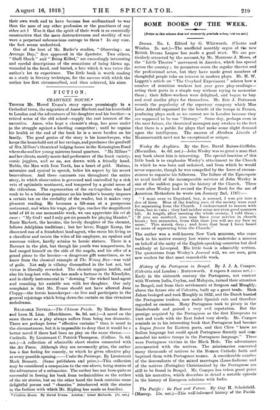FICTION.
CRABTREE HOUSE.*
THOUGH Mr. Howel Evans's story opens promisingly in a Cathedral town, the migration of Amos Harbott and his household to London and the adventures of his daughter and his brother—a retired actor of the old school—supply the real interest of the narrative. Amos, who kept a chemist's shop, has gone under in the struggle against a hustling competitor ; until he regains his health at the end of the book he is a mere burden on his family. The good genius of the story is his housekeeper, who keeps the household out of her savings, and purchases the goodwill of Mrs. Millner's theatrical lodging-house in the Kennington Road where she and her young mistress found quarters. "Ma Milner" and her clients, mostly music-hall performers of the freak variety, comic jugglers, and so on, are drawn with a friendly hand. Hablo, the Man with Iron Teeth, has a heart of gold. Malone, saturnine and cynical in speech, belies his aspect by his secret benevolence. And these contrasts run throughout the entire story, in which observation is governed and controlled by a rich vein of optimistic sentiment, and tempered by a genial sense of the ridiculous. The regeneration of the ex-tragedian who had sunk to be a bibulous pensioner on his brother's bounty imposes a certain tax on the credulity of the reader, but it makes very pleasant reading. He becomes a lift-man at a prosperous restaurant, and when his wage, plus tips, reaches the magnificent total of £8 in one memorable week, we can appreciate his cri de cceur : "My God ! and I only got six pounds for playing Hamlet." Rosie Harbott, the heroine, the lovely daughter of the chemist, follows Adelphian traditions ; but her lover, Reggie Kemp, the disowned son of a fraudulent land-agent, who earns his living as a chauffeur and resists the wiles of his employer, an opulent and amorous widow, hardly attains to heroic stature. There is a Baronet in the plot, but though his youth was tempestuous, he had ranged himself on the side of the angels, and his offer of a grand piano to the heroine—a dangerous gift sometimes, as we know from the classical example of The Wrong Box—was void of guile. Not only is villainy discomfited in the last act, but virtue is liberally rewarded. The chemist regains health, and also his long-lost wife, who has made a fortune in the Klondyke, and is chiefly instrumental in " downing " the wicked land-agent and reuniting his amiable son with her daughter. Our only complaint is that Mr. Evans should not have allowed Jane Cluppy—the heroic housekeeper—to live and participate in the general rejoicings which' bring down the curtain on this vivacious melodrama.


































 Previous page
Previous page